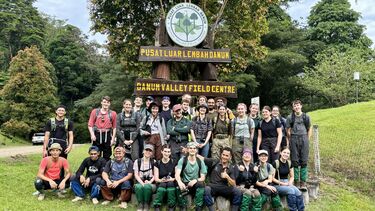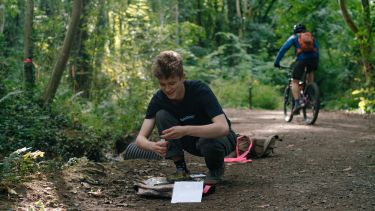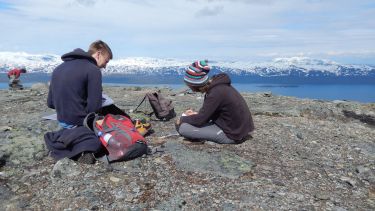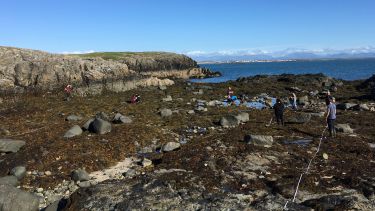Field courses
Field courses allow you to carry out your own research and develop an understanding of the ecology and biodiversity of different habitats across the globe.
You'll have lots of opportunities to get hands-on experience in the field throughout your studies as a Biological Sciences or Zoology student.
From one-day field trips exploring local ecological settings in your first year, to week-long adventures as part of optional UK and international field courses in your second and third year, field work is an excellent way of refining your skills whilst applying real-world ecological methods.
Field trips
Sheffield’s location gives you a great base for visiting scientific spots around the UK. We currently run trips to:
- Old Moor RSPB nature reserve (Barnsley)
- Potteric Carr nature reserve, Yorkshire Wildlife Trust (Doncaster)
- Marine rock pools (Filey, North Yorkshire)
- Greno Woods Nature Reserve for UK Habitat Mapping, Sheffield and Rotherham Wildlife Trust (Sheffield)
- Rivelin Valley for Riverfly Surveying (Sheffield)
Field courses
Second year
(Part of our Principles of Field Biology optional module)
If you choose our field-based module this year, you’ll head off on a UK field course to Whirlow Hall Farm and the Limb Valley, set on the edge of the Peak District National Park. It’s a great chance to study British biodiversity and ecology.
You'll learn to identify native species, carry out ecological surveys, and get hands-on experience of research design across diverse farmland, woodland, grassland, and river habitats. It’s great preparation for the more advanced fieldwork you’ll carry out in your third year.
Third year
For this optional field course, you’ll get a choice of fascinating habitats to explore, from dramatic landscapes in remote corners of the globe, to complex ecosystems operating right under our noses:
- Tropical Forest Ecology and Conservation Field Course - Borneo
- Population and Community Ecology Field Course - Peak District
- Arctic Ecosystems Field Course - Sweden
- Coastal and Marine Ecology Field Course - Anglesey
You’ll carry out your own research and develop an understanding of the ecology and biodiversity of different habitats. You'll also get to improve your analysis and presentation skills, and interact with our expert academic staff alongside other students on your course.
Tropical Forest Ecology and Conservation Field Course - Borneo
Location: Danum Valley Field Centre, Sabah, Malaysian Borneo
The Danum Valley Field Centre is at the edge of 400km2 of rainforest, where you can often see orangutans, elephants, gibbons, clouded leopards and many species of bird. You’ll learn about how the rainforest is structured, the threats it faces from the palm oil trade and ecotourism, and how scientists are working to conserve it.
It was an opportunity to experience a totally different environment and see lots of different animals and plants that I would otherwise not have been able to see. The highlight was definitely seeing a wild male orangutan crossing the bridge right in front of us."
Andrew
Biosciences student
Population and Community Ecology Field Course - Peak District
Location: Across the Peak District National Park
We make the most of the Peak District being on the doorstep of campus! This field course focuses on insect diversity, giving you the chance to assemble your own insect collection. You'll be learning about the conflicting pressures that affect the management of biodiversity in the Peak District, and the research methods that ecologists are using to make a difference.
The course surpassed all of my expectations, spending the week in the Peaks was lovely! Being non-residential meant we got to stay in our own bed after each long day which was really comforting."
Rachel
Zoology student
Arctic Ecosystems Field Course - Sweden
Location: Abisko Research Station in sub-arctic Sweden
You'll go to the Abisko Research Station in mid-summer, during a period of 24-hour daylight. Based on the shore of the Torneträsk Lake, 200km north of the Arctic Circle, you'll study a range of organisms - from carnivorous plants to grazing reindeer. Climate change is having a huge impact on this area, so understanding the local ecosystem and ecological processes is a key aim of this course.
It was great. I made new friends and the work wasn't as intense as I'd imagined but still hard work... I feel like I really developed my scientific skills. Having the chance either side of the course to travel was also great."
Meryl
Zoology student
Coastal and Marine Ecology Field Course - Anglesey
Location: A campsite by the shore in Anglesey
This is a chance to look at marine intertidal and coastal ecosystems. You’ll be based at an adventure field station right by the sea, and will visit seabird colonies and the coastal habitats Anglesey is famous for. From learning sampling techniques, you’ll go on to develop your own research project - possible topics include ecological processes, biodiversity, distribution and intertidal zonation.
The field course offered the chance to work with and study an ecosystem unlike anything we have here in Sheffield. It was very hands-on from the beginning, the entire group enjoying the childlike charm of rock pooling with the added rigour of scientific observation and study, as we developed our project ideas."
Richard
Zoology student
Costs for additional field courses
The cost of all core fieldwork is included in your tuition fees. This includes both one day field trips and compulsory field courses.
All optional field courses (except for non-residential UK field courses) incur additional costs which vary depending on a number of factors, including but not limited to destination and the number of students participating.
You can find the latest information about costs associated with field courses on the relevant course page below, under 'fees and funding'.

International undergraduate scholarships
We are offering scholarships of £2,500 for each year (subject to a 60% average) of your undergraduate degree. The maximum value is £10,000 for four-year programmes.





